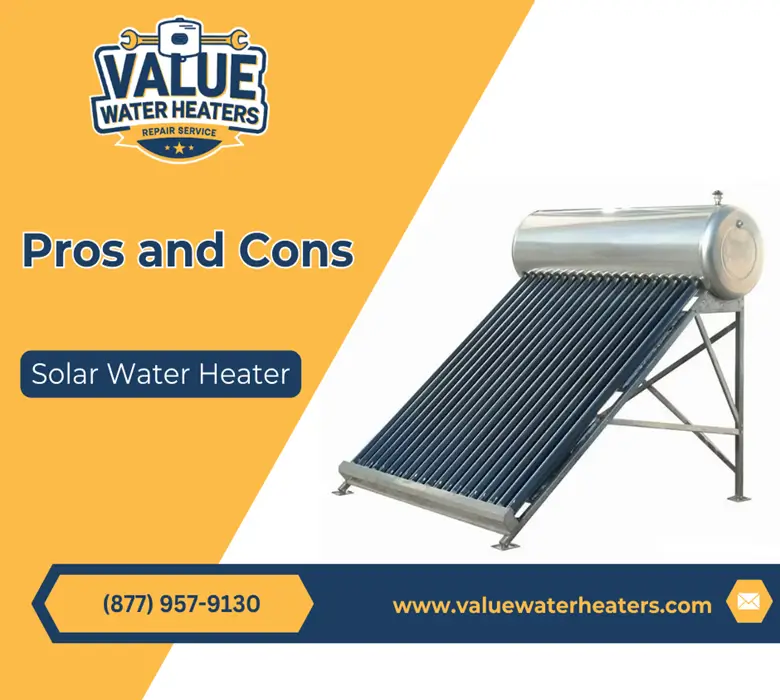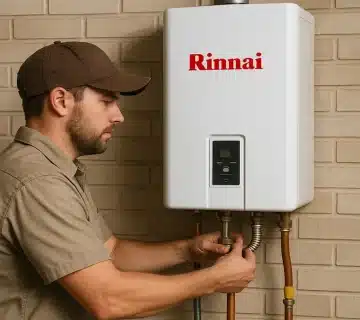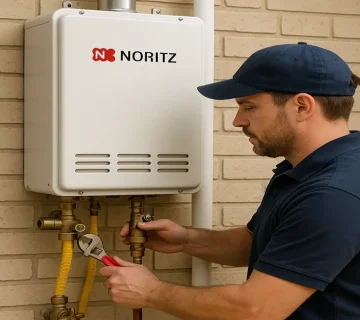Solar water heaters are becoming increasingly popular as an eco-friendly and cost-effective way to heat water for homes and businesses. If you’re considering upgrading your water heating system, it’s essential to weigh the advantages and disadvantages of solar water heaters to determine if they’re the right fit for your needs. Visit our homepage for more insights and explore this blog for detailed information.
What Are Solar water heaters? Solar water heaters use the sun’s energy to heat water, making them a renewable and sustainable option. These systems typically consist of solar collectors, a storage tank, and a backup heater for cloudy days. By leveraging the sun’s power, solar heating systems provide an efficient alternative to traditional water heating methods. Follow us on Facebook for updates and tips on sustainable water heating.
Solar water heaters come in two primary types: active and passive systems. Active systems use pumps and controllers to circulate water, while passive systems rely on gravity and natural convection. Both types have unique advantages and are suitable for different applications depending on the household’s needs, budget, and climate conditions.
5 Pros of Solar Water Heaters
- Energy Efficiency Solar water heaters significantly reduce energy consumption since they rely on solar energy rather than electricity or gas. This efficiency can lower your utility bills and reduce your carbon footprint. Studies have shown that solar water heaters can cut water heating energy costs by 50% to 80%, making them an excellent long-term investment.
- Environmentally Friendly Using solar heating systems decreases greenhouse gas emissions and reliance on fossil fuels, making them a greener option for households and businesses. Every home that switches to solar water heating contributes to global efforts to combat climate change by reducing carbon dioxide emissions.
- Cost Savings Over Time While the initial investment in solar heating systems can be higher, they often pay for themselves through energy savings over the years. Government incentives and tax credits can also help offset the upfront costs. In some regions, homeowners can also benefit from rebates and grants that make solar water heaters even more affordable.
- Low Maintenance Requirements Solar water heaters are designed to be durable and require minimal maintenance. With occasional inspections and cleaning, these systems can last for decades. Proper maintenance includes checking the condition of the solar collectors, ensuring that the storage tank is insulated, and flushing the system to prevent mineral buildup.
- Increased Property Value Installing solar water heaters can boost your home’s resale value. Buyers are increasingly interested in eco-friendly features that reduce long-term energy costs. A home equipped with solar water heating may attract environmentally conscious buyers willing to pay a premium for energy-efficient solutions.
5 Cons of Solar Water Heaters
- High Initial Costs One of the biggest drawbacks of solar water heaters is the upfront expense. The cost of installation and equipment can be higher than traditional systems, though incentives may mitigate this. Depending on the system’s complexity and size, prices can range from $3,000 to $10,000 or more.
- Weather Dependency Solar water heaters rely on sunlight to function effectively, which means their performance can vary in cloudy or cold climates. Backup systems are often necessary for consistent hot water. In areas with limited sunlight during winter months, a hybrid system combining solar and conventional heating may be required.
- Space Requirements Solar collectors need to be installed on a roof or in an open area with ample sunlight. This can be a challenge for properties with limited space or shaded locations. Ensuring that the roof can support the weight of the solar panels and the storage tank is also an important consideration.
- Installation Complexity Installing solar water heaters can be more complicated than traditional systems, requiring specialized knowledge and professional assistance. Proper placement and angling of the solar collectors are crucial to ensure maximum efficiency, which may require custom designs for some homes.
- Long Payback Period While solar water heaters save money over time, it can take several years to recoup the initial investment, depending on your energy usage and local incentives. For some homeowners, this payback period might feel like a long-term commitment that requires patience.
Factors to Consider When Choosing Solar Water Heaters
When deciding whether to install a renewable water heater, several factors come into play:
- Climate: Regions with abundant sunshine are ideal for solar water heating systems. However, even in less sunny areas, these systems can still provide significant savings with proper backup solutions.
- Roof Orientation and Space: South-facing roofs with no shading are optimal for solar collectors. Ensure your roof has enough space and structural integrity to support the installation.
- Budget: Evaluate your financial capacity for upfront costs and explore available incentives, rebates, or financing options.
- Household Water Usage: Larger families may benefit more from solar water heaters, as higher usage translates into greater energy savings over time.
- Maintenance Commitment: While maintenance is low, occasional upkeep is necessary. Consider whether you’re prepared to handle routine checks or hire professionals for maintenance.
Are The Solar Water Heaters Right for You?
Solar water heaters are an excellent choice for those looking to reduce their energy costs and environmental impact. However, they may not be suitable for everyone, especially if you live in an area with limited sunlight or have budget constraints. Carefully consider the pros and cons of solar water heaters and evaluate your specific needs before making a decision.
For homeowners committed to sustainability, solar water heaters provide a reliable and eco-friendly solution that aligns with a greener lifestyle. They are particularly advantageous for households in sunny climates, where energy savings can quickly offset the initial investment. Check out reviews and insights on Google.
Conclusion
Solar water heaters offer an innovative and sustainable solution for water heating, with numerous benefits such as energy efficiency and cost savings. While there are challenges to consider, their long-term advantages often outweigh the drawbacks for many homeowners. If you’re ready to explore solar water heaters, consult a trusted provider to assess your options and get started on a greener future.
By investing in solar water heaters, you contribute to reducing reliance on non-renewable resources, lowering greenhouse gas emissions, and saving on energy costs. Take the time to research your options and consult professionals to ensure a successful and rewarding transition to solar water heating. Visit our homepage for more details, or follow us on Facebook and Google for updates and inspiration.





